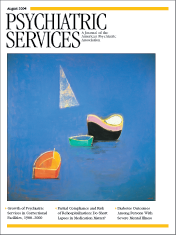A Comparison of Type 2 Diabetes Outcomes Among Persons With and Without Severe Mental Illnesses
Abstract
OBJECTIVE: Type 2 diabetes is an important comorbid medical condition associated with schizophrenia. The objective of this study was to compare glycosylated hemoglobin (HbA1c) levels of patients who had type 2 diabetes and schizophrenia with those of patients who had type 2 diabetes and major mood disorders and those who had type 2 diabetes but who did not have severe mental illness. METHODS: A sample of 300 patients with type 2 diabetes was recruited from community mental health centers in the greater Baltimore region and nearby primary care clinics. Of these, 100 had schizophrenia, 101 had a major mood disorder, and 99 had no identified severe mental illness. HbA1c, the main outcome measure, was compared between the group with schizophrenia and the other two groups. RESULTS: All three groups had HbA1c values above recommended levels. HbA1c levels were significantly lower among patients with schizophrenia than among patients who did not have severe mental illness but were not significantly different from those of patients who had major mood disorders. Patients for whom olanzapine was prescribed had higher HbA1c levels than those for whom other antipsychotic agents were prescribed. CONCLUSIONS: All three groups of patients require improved diabetes treatment to achieve acceptable HbA1c levels. There may be previously unrecognized benefits for diabetes management among persons with severe mental illnesses who are receiving regular mental heath care, but these individuals may also have risk factors that can influence diabetes outcomes and HbA1c levels.



